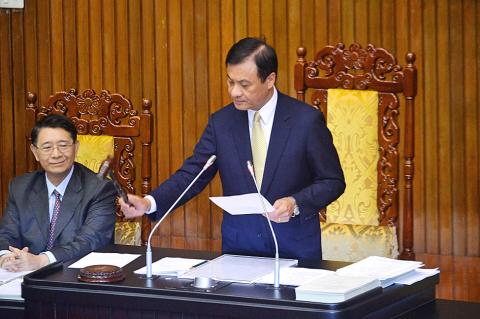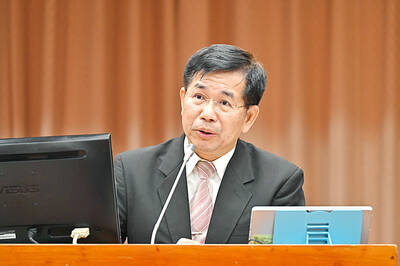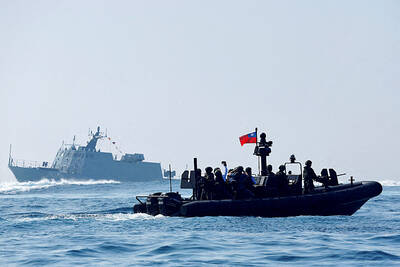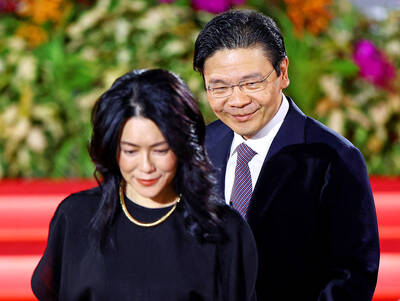The Legislative Yuan yesterday passed the new Act Governing Recruitment and Employment of Foreign Professionals (外國專業人才延攬及雇用法), which allows foreigners interested in working in Taiwan to extend their work visa, lifts the restriction on the minimum duration of their stay and includes faster enrollment in the National Health Insurance system.
Under the act, foreigners would be able to apply for a four-in-one “gold card” that incorporates a work visa that allows them to transition between jobs without legal restrictions, a resident visa, an Alien Resident Certificate and a re-entry permit.
Foreign professionals are to be allowed to apply for the card on their own without the approval of their employer.

Photo: CNA
With the passage of the act, the maximum duration of stay for foreigners holding a work visa or an Alien Residence Certificate has been extended from three to five years, while the required minimum duration of stay of 183 days every year has been abolished.
A work visa holder is to be granted an extended stay of no more than five years if their employer requires them to stay in their job for an extended period of time.
Foreigners looking for a job in Taiwan are to be eligible to apply for a “job-seeking visa” that is valid for six months.
A tax deduction rate of 50 percent of annual income is to apply to a foreign worker whose annual salary is NT$3 million (US$99,437) or more for three consecutive years.
People with Alien Permanent Resident Certificates are to be included in the pension system. They can decide whether to claim their pensions in a lump sum or in monthly payments.
A six-month waiting period before foreigners, their spouses and children awarded an Alien Resident or Alien Permanent Resident certificate can join the National Health Insurance system has been lifted and foreigners can now apply to join the system upon receipt of their certificate.
The act also covers residents of Hong Kong and Macau working in Taiwan.
The act includes an article stipulating that a cap is to be set on the total number of work visas issued to foreigners every year.
The cap is to be reviewed every year and adjusted if necessary.
A disputed “internship visa” with a validity of two years was vetoed by lawmakers, apparently out of concern about foreigners taking lower-paid jobs under the guise of an internship, hurting the job opportunities of Taiwanese.
Democratic Progressive Party Legislator Karen Yu (余宛如) said “unfriendly” restrictions have been the major obstacle preventing foreigners who love Taiwan staying in the nation and that she hoped the act would help to retain more foreign talent.
The nation faces the dual problem of transitioning into a superannuated society and a lack of professional talent due to a low birth rate, with the University of Oxford saying that Taiwan is forecast to face the most severe shortfall in talent worldwide in 2021, she said.
Therefore, the nation is in need of a strategic population policy such as moderately opening up to foreigners, which would in turn help improve the economy, she added.

The International Industrial Talents Education Special (INTENSE) Program to attract foreigners to study and work in Taiwan will provide scholarships and a living allowance of up to NT$440,000 per person for two years beginning in August, Minister of Education Pan Wen-chung (潘文忠) told a meeting of the legislature’s Education and Culture Committee yesterday. Pan was giving an update on the program’s implementation, a review of universities’ efforts to recruit international students and promotion of the Taiwan Huayu Bilingual Exchanges of Selected Talent (BEST) program. Each INTENSE Program student would be awarded a scholarship of up to NT$100,000 per year for up to

BASIC OPERATIONS: About half a dozen navy ships from both countries took part in the days-long exercise based on the Code for Unplanned Encounters at Sea An unpublicized joint military exercise between Taiwan and the US in the Pacific Ocean last month was carried out in accordance with an international code, the Ministry of National Defense (MND) said yesterday. According to a Reuters report citing four unnamed sources, the two nations’ navies last month conducted joint drills in the Western Pacific. The drills were not made public at the time, but “about half-a-dozen navy ships from both sides, including frigates and supply and support vessels, participated in the days-long exercises,” Reuters reported, citing the sources. The drills were designed to practice “basic” operations such as communications, refueling and resupplies,

‘MONEY PIT’: The KMT’s more than NT$2 trillion infrastructure project proposals for eastern Taiwan lack professional input and financial transparency, the DPP said The Democratic Progressive Party (DPP) caucus yesterday said it would ask the Executive Yuan to raise a motion to oppose the Chinese Nationalist Party (KMT) caucus’ infrastructure proposals and prepare to file for a constitutional interpretation if the KMT-dominated legislature forces their passage. The DPP caucus described the three infrastructure plans for transportation links to eastern Taiwan proposed by the KMT as “three money pit projects” that would cost more than NT$2 trillion (US$61.72 billion). It would ask the Executive Yuan to oppose public projects that would drain state financial resources, DPP caucus secretary-general Rosalia Wu (吳思瑤) said. It would also file for

Singapore yesterday swore in Lawrence Wong (黃循財) as the city-state’s new prime minister in a ceremony broadcast live on television after Lee Hsien Loong (李顯龍) stepped down following two decades in office. Wong, formerly deputy prime minister, was inaugurated at the Istana government office shortly after 8pm to become the second person outside the Lee family to lead the nation. “I ... do solemnly swear that I will at all times faithfully discharge my duties as prime minister according to law, and to the best of my knowledge and ability, without fear or favor, affection or ill-will. So help me God,” the